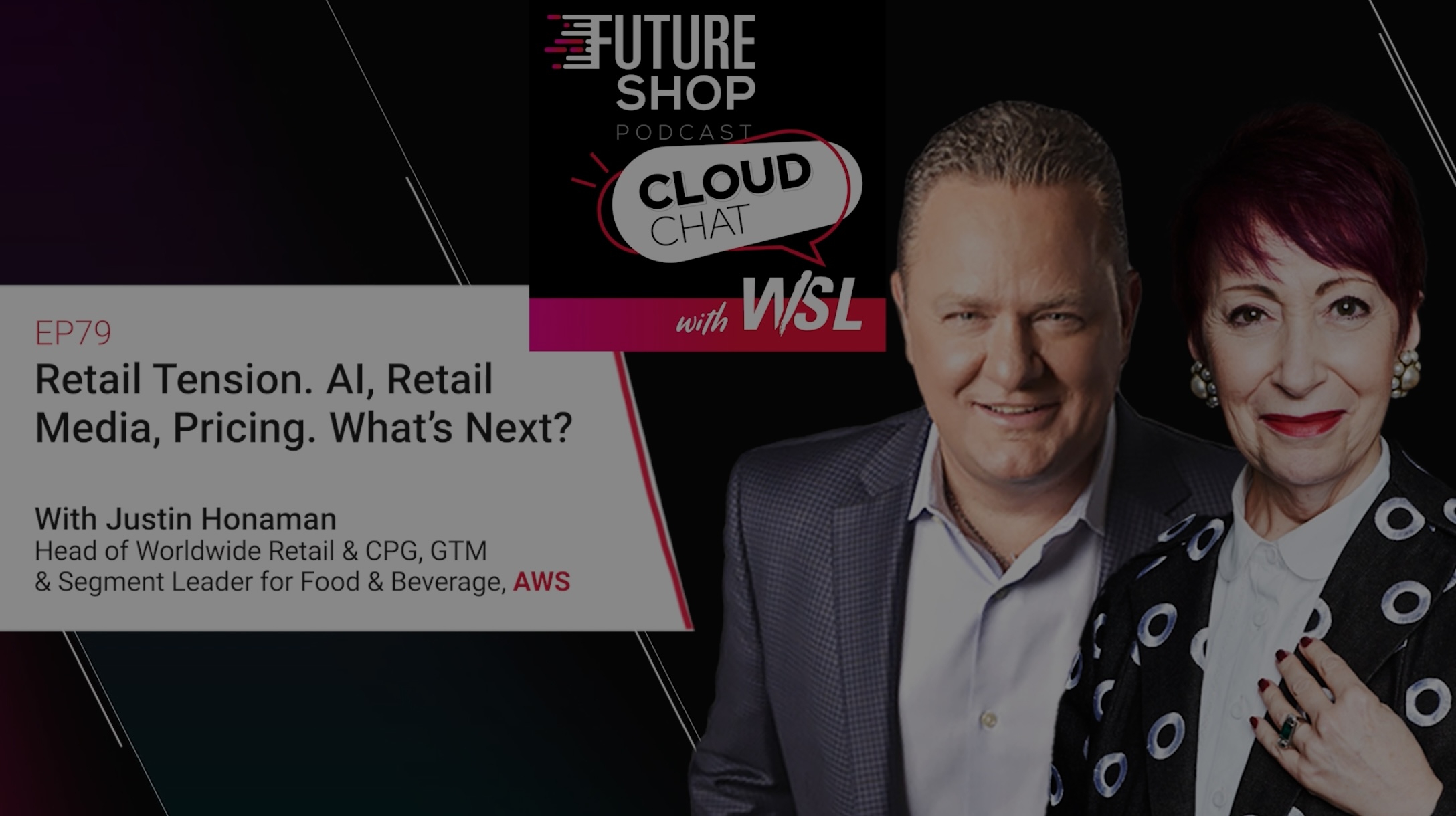In this episode:
Wendy Liebmann, WSL’s CEO and Chief Shopper and Justin Honaman, Head of Worldwide Retail & CPG, GTM & Segment Leader for Food & Beverages for Amazon Web Services, continue discussions about emerging technology and the implications for the future of retail.
They discuss:
- The tension points at retail: prices, efficiency and where to invest.
- AI: is it hype or not? New and different ways to use AI to become more efficient
- Personalization and composable commerce, and what that looks like from a modernization perspective
- Increasing investment in tech in new store openings
- Retail media – what’s next? Who’s winning?
- Not throwing the baby out with the bath water. How to maintain the best of the old while adopting the new.
Don’t miss upcoming episodes, subscribe to our podcast with your favorite app.
Watch the video episode:
Wendy 00:10 hello everyone. I'm Wendy Liebmann, CEO and Chief Shopper at WSL strategic retail, and this is Future Shop. Well, actually it's Cloud Chat with my global my partner in crime and all things cloud. Justin Honaman, I could, I always have to squint at his title, because it's worldwide, Justin H. 00:29 head of the World retail consumer goods. That's I work in those industries. Yeah, Wendy 00:33 Everything, everything, everything. Hello. Justin, lovely to see you. Justin H. 00:36 You too. I'm glad we were able to make this work. We've been trying to schedule this for a few weeks. So no, we've Wendy 00:41 been, we've been so madly busy, both of us wandering around all places. Actually, it's been helpful when we when we needed to pause for a minute, because I've spent quite a bit of time over the last few weeks on the road in Boston, Las Vegas, Chicago, all those exciting, New Jersey, exciting spots. And one of the things I've noticed in discussions with both CPG and retail senior executives, is this sort of sense that Yeah, yeah, yeah, AI AI but let's get over it and not get over it in the sense that it's not a valuable thing and important for everybody to understand and use cases being developed, but that they feel like it's a tool, it's going to be helpful, but actually, we can't just focus on AI for AI sake, and they are onto bigger issues like or volume, traffic. So question for you, what are you hearing out there, Justin H. 01:41 certainly in both retail and consumer goods, continued interest in AI. Remember, we've talked about this on our previous episode, but can AI encompassing now machine learning and, and generative AI and neural networks. So there's no question also that the hype, the excitement, the what is it, tell me what this is. Why should I care? You know, there that was like last March through September, October, and then quite a few of our customers are in using and leveraging and testing, if not already, deploying capability, specifically around generative AI and Yeah, and so now, I say the last couple of months, we've seen, in addition to that topic, it's it's led to new discussions around data. It's led to new discussions around personalization, around search for those retailers that have E commerce platforms, around composable commerce. And you know what? That, what that looks like, from a modernization perspective. On the CPG side, certainly a lot of focus on SAP and whether or not to move to RISE, which is all kind of their ERP back end. So I'd say a lot of conversations with AI, as either part of it or separate from but I agree. And actually, you know, generative AI took over the conversation for us and many others for several months and and now, that's still a big part of the conversation, as well as things that we were talking about before. Wendy 03:15 you had been talking about that a while ago, the sort of getting on with it, testing, experimenting in companies, training your people, so they know what's going on. So, so you've been, as you often are, ahead of that curve, because you're so talking to so many people. And I, you know, I think about the bigger, I'm going to call it the Cloud story that you just sort of the picture that you just painted, that there are so many ways that technology is going to enhance our ability to more, be more, both more precise, but also be more what's the word? Financially, it's more efficient. So it feels like it's part of the bigger Clouds, as opposed to this piece that we're chasing up and down. Justin H. 04:03 So I mean, for if any of you haven't seen us have this conversation before, I mean, the ability to leverage generative AI, what are called large language models or foundation models, it just doesn't work well on premise. So you need access to data, and hence the acceleration and move to Cloud or move to Cloud based capabilities that allow you the ability to get to that data quickly, and then run use cases or models against data. And so, yeah, those things do work together. Also, just think about data security and flexibility, scalability, the ability to try new things. We call it a two way door experiment here at Amazon, where, you know, in the world of generative AI, you can take a set of data, apply a model to it, if it, if it yields a good outcome, you can go deploy it, and if not, you turn it off. No harm, right? I don't have to go, you know, I needed to buy servers and spin those up and use people in capacity like I get that part of Cloud. So. So, yeah, those things are linked together. But so is cloud, tied to Cloud POS systems and new merchandising capabilities and allocation capabilities and the ability to do different type of forecasting and in store technology, whether you have Edge capabilities and RFID so like there are many parts of the retail landscape linked to Cloud or flexible technology capability. And, of course, I think we, as we've said before, AI and generative AI will be a big part of any sort of customer experience in the future. Wendy 05:34 It's so interesting. I'm always saying it's so interesting with you, because it's always so interesting. That was another discussion I had just recently, talking about that balance between big data, small data. I just pulled out a book by a friend of mine, Martin Lindstrom, which he wrote about, I don't know, seven or eight years ago, when everybody was running around talking about big data, big data, and he was talking about small data, Justin H. 06:43 thinking about the world of data and analytics, let's look do a little history lesson here. I mean, I could roll back the clock to when I was at Coca Cola, which is was not recent. And, you know, we were working hard to integrate retailer point of sale data, operational data from 74 Coke bottlers, and a food service organization and a Minute Maid company and Odwalla which doesn't exist anymore. And Glasgow, which was like SmartWater, environment, you know, big data problem opportunity, because we wanted to be present a single face to customer. Okay, and that was super expensive because of the hardware and the integration. But man, we did it and the value of that data allowed for, you know, perfect order, they had ship notifications, predictive ordering, better service to retail customers and whatnot. Okay. And at the time, I mean, and then we learned about big data, which was the big, you know, there was a lot of buzz. This is around late 2000s, 2010 2011, I believe. People like Tom Davenport, you mentioned what book you've read. The book of the time, by the way, was a book called “Competing on Analytics”. And so and you know, if you are out there, and you're in data and analytics, you'll probably have a job for life. Like if you just like that space, it will be here today. And today, it's AI and machine learning. But tomorrow will be the next thing. And the next thing. So just I'll start with that. Now, on the retail side. So absolutely. Most of our customers are still operating in a world of spreadsheets and access databases, in terms of managing data and information. Most of them still have not solved their problems of Wendy 09:22 a similar conversation, one of these conversations recently, and you made me think about it, when you talked about coke and the bottlers and distributors, whatever was, because this fellow said to me, you know, the people who are really winning are the DSD companies, the companies that are both in the store, but have the data the two pieces to the pie. I thought that was so interesting, because, you know, there you are, in the day of, you know, the big the big food beverage companies that deliver used to be the greeting card companies, I think, used to do a lot of USD all of that. So. That was interesting to me, too, because it was like, Oh, look at that. Think of think about those companies and the advantages and benefits, they have in in in all of that. So. So what else in your travels? Anything else we should keep our eye on until we meet again? Justin H. 10:15 On the retail side, I think we highlighted a lot of the areas of continued focus and supply chain and trying to find new and different ways to become more efficient there, both on the retail side as well as the brand side, and that includes the tech, but also, like the process part of that. So it's been interesting to see how companies have been diving in in that space. I still, I would still say also that we see like, you know, early adopters, that again, the ones that are running with an existing set of skills that they can then leverage very quickly to try out and spend new capabilities. A lot of interest and hate, like around the hype of AI. Like, what show us what's real. Like, show us what customers are doing. Or, what do you guys have at Amazon that we can leverage? How does it work? A lot of those types of conversations, but also like, what's ideal, doesn't really work. It will one day. It's kind of we're still ahead of the game on some of that. And then the last area we haven't talked about much is physical store technology. And I mean, we're seeing many of our customers that are launching new stores, opening stores, growing stores, also investing in tech in store, and that includes loyalty. And yes, there is another end of the spectrum in retail, retailers that are struggling and closing stores very much in retail, kind of a split screen right now of growth and for some and then struggles and others. It's very an interesting tension playing out in that industry. We've Wendy 11:39 we've always said channels are dead, because we look at, you know, we know companies have organized around channels, particularly on the, you know, customers and category and all of that. But we've always said it's irrelevant, because shoppers don't think that way, right? They don't think about the channel. And now we're seeing in areas like drug, for example, where you've got three, the three majors or two majors and a minor. E1 you know, very different paths, different strategies, clarity, lack of clarity, all of that. Somebody said to me the other day, it's not the channel, it's actually, we are N equals one. We are unique in what we're delivering. I thought that was an interesting discussion. But the other is, when you talk about the winners and who's where it's working and where it's not, is that a type of retailer versus or is it just the good, the people who are doing it well and the people who aren't? And it doesn't matter what channel they're in, long and long story. Justin H. 12:41 Yeah, you'd have to dive into each segment of retail. You know, fashion, apparel, health and beauty, grocery, drug, convenience, durables, like in each of those you could, you could do, if we had time, you could almost segment what's working, what's not, in each of those sub segments. Because when you say retail, as you just said, like a digital commerce natives, like we were talking about, Mercado Libre, one of our customers in Latin America, you know, anyway, you could take each segment and break that down. Those that are investing in innovation typically are focused most on the customer or the customer experience, right? And so that's one thing. Consumers in certain channels and search for certain products are very price sensitive. Right? Now, you know, groceries, use, we all read quite a bit around the pricing from brands to retail or retailer to customer. There's a lot of tension in that space and struggle. Wendy 13:52 buy. The other buzz is, you know, was, has been retail media, retail media, retail media. And now I'm hearing the sort of air come out of that balloon somewhat in terms of, we've, we already had that discussion, you and I, about, is it a, is it a money play, or is it really, you know, the ability to take all this data and personalize something just for Justin, you know, just for you, Justin H. 14:16 right? I mean, so yeah, for those that maybe are new to that topic, we've been this is an interesting one. We've been talking about that topic, retail, media, networks, and seeing the projected growth over the last 24 months or so, some retailers are cashing in on that, right? They're driving new revenue streams by putting screens on their stores and digital, online and whatnot. And for the brands, you know, they're having to come up with different pots of money to pay for that. You know, it'll be interesting. We've got a couple of big events coming up. You could really get some signals around that with Grocery Shop this fall. With NRFin January, the that. I think it will be very interesting to see progress around that. Of course, for us in our Amazon advertising business. This is, you know, there's multiple ways of leveraging advertising across channels, so it's an area to keep an eye on. Is it hype versus reality? I you know that really the truth will be in the numbers. And, you know, for some retailers, there's some good numbers, and for others, I think it's early days. Wendy 15:16 Yeah. So lots of tension, lots of shiny objects that need to get put into a perspective of what value they bring to shoppers, right, which is always my bias, and how do they make companies more efficient, prices more affordable, people feel happier about what they're buying. So lots of, lots of big, lots of big topics for us to continue in our, in our journey together, Justin H. 15:45 floating into the I find that as I thought about this this last week before I knew we were going to talk today. And, you know, I think last year, I don't know the timing, you know, I'd almost, I'd finished my presentations at these events and say I couldn't be a better time to be in retail and consumer goods. And I'll tell you, I think there's some, there's some real tension right now, in those industries. And so a lot of hype has come and gone, a lot of cycles. You know, we're kind of get anyway, it's just an interesting time and and I think the leaders in different groups are trying to sort through that. You know, what from the old, do we need to leverage because it worked, versus what some of the new we need to be taking advantage of, you know, and then do we need new people? What kind of people? It is really interesting cycle happening now in our industry, yeah. Wendy 16:31 And I think, you know, the funnel discussion there is, you're absolutely right, and that whole notion around leadership, and how you build organizations and culture, to support all this that's going on, and not just throw out the proverbial baby with the bath water, but I did so more, more for us to discuss on our next I did think of you in the cloud as the as the balloon went up at the Olympics, and I thought there's Justin. He's probably up there. I knew some people who took the their Amazon clients to the Olympics. I thought, Wow, that's nice. So anyway, but I did think of you as that cloud Justin H. 17:09 you thought of me. I have not been in Paris. I have been with customers. Nice Wendy 17:15 As we both have well as always. Thank you for the continuing reality check about all of this and and to seeing you very soon and we will continue our floating into the ether to unravel all the questions of the world. Justin H. 17:31 Thank you, and thanks for having me on regularly. Wendy 17:33 Thanks Justin always Cheers for now. the little things that are emerging that bubble up that you're missing. And I was having that conversation with somebody this week, and we were talking the executives or director level or whomever, who are now so stuck behind their screens, running data on all manner of things and don't get into the stores anymore. Meanwhile, you know, private brand, or, niche brands are starting to steal share on the shelf. So it's so interesting to me, I cannot figure out whether we run off after something that's so shiny, and then we forget all principles, as opposed to this sort of merging of both. Who are you seeing out there? Name names or not, or industries that are actually still doing, you know, walking the stores, looking at the shelves, looking at data, have a system that's for E commerce separate from the stores. On the brand side, it's an even bigger challenge where you got multiple ERPs.Where you do see more flexibility as for the digital native retailers, ecommerce, native retailers, or the brands that have started, you know, that are the new upstart brands, beverage brands, food brands, they don't have all that technical debt, so they have easier and faster access to data. They're more willing to take risks, they can try out, you know, talk about generative AI, no problem. They're buying and getting wanting access to things like NielsenIQ data. So those are things that are absolutely the case today. I'd say last but not least, the companies that are making the most headway with tech have already they already have have some sort of competency in the organization, they're able to move more quickly to try out some of these capabilities. Does that make sense? So they've got competency they have kind of leadership buy in, and they can they have a method or an innovation process. And that's not an analytics problem, right? That's a you know, you've got a consumer that is, while the market looks hot, is struggling to afford and certain products, right? And so they're switching and looking at different places to buy and whatnot.



















